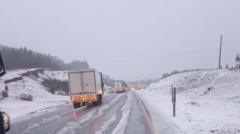As millions prepare for Thanksgiving, an Arctic outbreak is creating hazardous conditions across the U.S., affecting travel plans with snow, thunderstorms, and record numbers of delays.
Arctic Chill Disrupts Thanksgiving Travel Across the US

Arctic Chill Disrupts Thanksgiving Travel Across the US
An Arctic blast brings severe weather, impacting Thanksgiving travel with flight delays and cancellations nationwide.
As the Thanksgiving holiday approaches, a sudden Arctic blast is set to disrupt travel plans for millions across the United States, coinciding with one of the busiest travel periods of the year. The National Weather Service (NWS) has warned of "dangerously cold wind chills" expected primarily over the northern Plains on Thursday, creating treacherous conditions for travelers.
In the northeastern regions, including New England, predictions of heavy snowfall add to the mix, with snow also likely to affect parts of Maine, New York, and the northern Appalachians. Meanwhile, the East Coast braces for thunderstorms impacting states such as Georgia and the Carolinas. Weather forecasts indicate that stormy conditions will advance to the Midwest by Friday, bringing lake-effect snow and severe thunderstorms, with potential accumulations of up to 8 inches (20 cm) in some areas.
The impact on travel has been significant, with flight tracking site FlightAware reporting over 4,500 delays and 61 cancellations as travelers attempt to reach their holiday destinations. The TSA, acknowledging the surge in travelers, anticipates nearly 9 million people will pass through airports in a three-day span that includes the peak travel days of Tuesday, Wednesday, and the Sunday following Thanksgiving. This year is set to see nearly 80 million Americans traveling at least 50 miles by car, assisted by lower fuel prices compared to the previous year.
On the West Coast, weather challenges persist with dense fog warnings issued for the Pacific Northwest and California, along with freezing fog reported in Oregon and parts of Washington state. The region is still recovering from an earlier winter storm that caused heavy snow and high winds, compounded by "atmospheric river" events leading to further weather instability.
With weather conditions continuing to evolve, authorities and travelers alike remain vigilant as the nation navigates one of its busiest travel seasons amidst an Arctic chill.




















